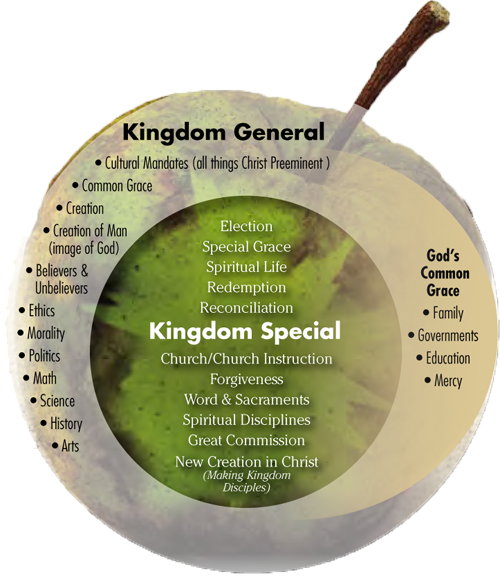
 In our Christian education and Publications training events, we use the phrase “the whole Gospel for the whole church.” We have been asked what we mean by that, to which we have responded: Kingdom discipleship focuses on the whole truth of scripture, and its audience is the entire church at all age levels.
In our Christian education and Publications training events, we use the phrase “the whole Gospel for the whole church.” We have been asked what we mean by that, to which we have responded: Kingdom discipleship focuses on the whole truth of scripture, and its audience is the entire church at all age levels.
In Making Kingdom Disciples: A New Framework, we point out that Calvin’s emphasis regarding making disciples begins at the earliest stages of a covenant person’s life. The sooner we begin to self-consciously disciple our covenant children, the easier it will be for them to see themselves as covenant children belonging to God’s kingdom and that being a Christian is not only about going to church, or personally believing in Jesus, or reading or hearing the Bible, but every day of the week in all things we are to live for Christ. He is Lord of all. As we have said many times, discipleship involves “teaching to observe all things that God has commanded” and that is connected with baptism. It involves helping our children understand who they are, as well as who God is. As we teach them by the Word and example, our prayer is that they will soon claim for themselves that reality.
In the three previous issues of Equip to Disciple we have focused on: What is the kingdom? What is the church? How do they relate, and what is their respective roles in God’s sovereign plan? As the covenant family, we must obey the Lord’s command expressed in both commissions referred to in previous articles.
I have asked Ms. sue Jakes, our Christian education specialist who focuses on children’s ministry, and our youth and family consultant, Danny Mitchell, to give us their ideas about how a local church can implement a plan of disciple-making with our families, children, and youth. You will recall in the previous issue of equip to Disciple, we made suggestions for the adult education or discipleship strategy.

If nothing else will bring you to the throne of grace begging for mercy and wisdom, the responsibility of discipling children will. And the whole body of Christ has that responsibility. Before we consider each portion of our duty, we must pray that we would never hinder, but always aid, our children’s journey into and through the Kingdom. We must also pray daily for the children in our home and church, that the spirit will work in their hearts that they might become true Jesus men and women.
The most strategic place for making Kingdom disciples in the local church is in the ministry to children. Not only are the children learning and growing, but also all who are teaching and leading are growing as disciples in the process. Most educators agree that one does not truly know anything until he teaches it, and as we teach the Word to young children we can expect it to be life-changing, not only for them, but for us. The foundation of our disciple making ministry for children should be the true teaching of the Word which conforms to what is being preached from the pulpit. Great Commission Publications’ Show Me Jesus curriculum teaches the whole counsel of God, seeing Christ in all of scripture, and trains the teachers to communicate the gospel story in every lesson. Whether this complete Bible curriculum is used in Sunday school or some other Bible instruction setting, it should be foundational in the training of the children in your church.
In conjunction with the knowledge of the Word which leads us to Christ, children must be indoctrinated, understanding what they believe and why. For centuries the church has catechized her children. We must not stop now, but if we have ceased this practice, we must begin again. Very few catechism programs in the church are successful without strong parental involvement. If you have a special program intended for catechism memory, parents should be guided in their home study and memory work with their children.
 A kingdom disciple is not only one who knows King Jesus, but one who loves, serves, and thinks like King Jesus. How do we begin to take our children from the classical grammar stage of their faith into the logical and rhetorical living out of what they believe? A standard component of our ministry to children must be parental training. It is the serving, giving, loving, obedient parent who will most likely produce a serving, giving, loving, obedient child. Again, this is a heart issue, but no person can see a parent’s heart better than their own child. They are blessings in this way – always reminding us of our need of saving grace. As we know and see the needs of each individual child, the church’s ministry is to ask what we can do to aid the parent in bringing the child to Christ. This is the gospel message – Jesus came down to earth, becoming man, and we must meet every child and family where they are, while knowing that our God is faithful. He is most glorified when the most difficult circumstances are overcome each day by the work of his grace. True kingdom ministry is never trying to get around a special need, but looking for the power of God to work mightily in it.
A kingdom disciple is not only one who knows King Jesus, but one who loves, serves, and thinks like King Jesus. How do we begin to take our children from the classical grammar stage of their faith into the logical and rhetorical living out of what they believe? A standard component of our ministry to children must be parental training. It is the serving, giving, loving, obedient parent who will most likely produce a serving, giving, loving, obedient child. Again, this is a heart issue, but no person can see a parent’s heart better than their own child. They are blessings in this way – always reminding us of our need of saving grace. As we know and see the needs of each individual child, the church’s ministry is to ask what we can do to aid the parent in bringing the child to Christ. This is the gospel message – Jesus came down to earth, becoming man, and we must meet every child and family where they are, while knowing that our God is faithful. He is most glorified when the most difficult circumstances are overcome each day by the work of his grace. True kingdom ministry is never trying to get around a special need, but looking for the power of God to work mightily in it.
As a child sees the gospel in everyday living, he must be given every opportunity to use his faith language. Children should be praying. They must watch us pray, pray with us, and then be encouraged to pray continually. serving the family, the Body, and the community is also using their faith language. As we find each child’s gifts by exploring what they love to do, we must then give them many occasions to serve others. Children should also have the opportunity to verbally communicate what has been imparted to them. Again, we tell them all that we know, but do they really know it until they have to teach it themselves? Often times we shy away from having older children teach younger, but this is still the best training ground if they are going to be disciple-makers themselves. And isn’t this the only true measure that we have made a disciple – that they become disciple-makers themselves?
Are we teaching our children to take every thought captive to Christ? Are we defining the culture through the Kingdom grid? The church and home must come together continually and ask these questions, holding one another accountable to the task of training our children by God’s Deuteronomy 6 method. We must talk of these things when we rise up.
Do our families begin the day with Kingdom talk, giving God’s purpose for the day that he has made? And when we sit down, are we reading the Word at home around the meal table, discussing truth and how we apply it to all of life? And when we walk along the way (or drive in the car), are we spending our time wisely preparing our hearts for Kingdom work, singing his songs, telling his stories? And when we lie down, do we remember his good deeds and pray for all those who we are called to remember and serve? Life is war and our children must be armed for it on every front.
It is time to raise our expectations for the next generation of Kingdom disciples. But as we raise our expectations we must also raise our commitment to the task to which God has called us. examine your home and church. Are we getting by with programs and ideas that we hope will work out in the end? Or do we have a clear vision about what we are to do and how we are to implement God’s plan for making Kingdom disciples? You can read this and be overwhelmed or overjoyed. We must be overjoyed that God would continually entrust us with his children and his promise. He will be God to our children and our children’s children. And as we obey him in his commission to make disciples by populating the world with the next generation of Christians, we must never be overwhelmed because he has all authority in heaven and on earth, and he is with us.
 Most churches will at some point wrestle with the question of purpose for their ministry to the next generation. The answer to this foundational question becomes the destination point that the entirety of the youth program is moving toward. In the same way that a GPs needs the destination point in order to tell you how to get there, a youth ministry needs a desired outcome to be able to chart the best course of action. Without a well-thought out, biblically-informed, easily-understood purpose, your youth ministry will waste valuable time on programs that do little more than entertain the rising generation. For this reason, every church should not only do the work necessary to answer the question of purpose in ministry to youth, but it should regularly use that purpose as the lens with which the youth program is evaluated.
Most churches will at some point wrestle with the question of purpose for their ministry to the next generation. The answer to this foundational question becomes the destination point that the entirety of the youth program is moving toward. In the same way that a GPs needs the destination point in order to tell you how to get there, a youth ministry needs a desired outcome to be able to chart the best course of action. Without a well-thought out, biblically-informed, easily-understood purpose, your youth ministry will waste valuable time on programs that do little more than entertain the rising generation. For this reason, every church should not only do the work necessary to answer the question of purpose in ministry to youth, but it should regularly use that purpose as the lens with which the youth program is evaluated.
In youth ministry, our first inclination is to judge a program by numbers. Our second inclination is to try to decide the effectiveness of what we do by determining how much fun our students had at a particular event. unfortunately, we are often further down the list of ministry critiques before we start analyzing our program based on whether or not Kingdom disciples are being produced. It is a sad indictment for any church that would believe that their ministry to the next generation is doing its job because 100 youth went on the ski trip or they all had an awesome time at the lock-in. That is not to knock the value of these types of events in a youth program. Youth need places within the body of Christ to have fun. However, the call of the Church is to make disciples, teaching them to obey all that Christ has commanded. This is the basis and purpose of our ministry to rising generations. It is also the standard by which we should judge our youth programs. How does your annual trip to the slopes of Colorado help your church develop your youth as Kingdom disciples? Or, for that matter, how does helping with recreation at VBs help a teenager become a Kingdom disciple? By asking these kinds of questions, your church can more effectively use its resources to grow the next generation into a generation that seeks after the Lord.
Whether your church decides to continue, cancel or add a ski trip to Colorado is a decision that can be made at any point. There are any number of disciple-making reasons to decide to go, and any number of reasons that a church would decide not to. In other words, the methodology of disciple-making in youth ministry can vary from church to church. One example that several churches in our denomination are dealing with, concerning their youth programs, has to do with summer mission trips. Traditionally, youth ministries go on a summer mission trip. There was a time that many of us felt that that the more exotic the locale, the more effective the trip would be. Getting students out of their comfort zone; so we scoured the globe for just the right comfort-stretching location. In an attempt to be missional in our “Jerusalem,” the trend over the past few years has been to look closer to home for our summer youth mission experience. Both types of trips can be effective in helping grow your students into Kingdom disciples. Your youth ministry decision-makers can make that call. The kingdom disciple-making principle here is that the youth of your church need to be engaged in outreach ministries; ideally, both global and local, but the ministry context of a particular church and available resources will drive that decision.
There are several other kingdom disciple-making principles that should be part of any youth program. Before we go further, it may be helpful to give a working definition of a Kingdom disciple. A Kingdom disciple is someone who thinks God’s thoughts after Him and applies them to all of life. That is what your church should be striving toward with its youth ministry. That is the answer to the question of purpose for next generation ministries. The next step is to think about the kingdom disciple-making principles that come from our purpose and should be part of your youth program. From these principles, your church should make its programmatic decisions.
1. Knowing the Word: every church needs to work to effectively teach the Word of God to its teenagers. using biblically strong material like Great Commission and Publications’ So What? youth Bible studies is important. However, you also need teachers of the Word who know how to apply it to this generation of teenagers. This requires that adults be willing to spend adequate time in teaching preparation, time listening to the struggles and joys of their youth, and time learning what is going on in youth culture. At most, we will have three or four opportunities (sunday school, sermon, youth group and discipleship group) each week to teach the Word to the students in our church. That is maybe four hours out of each week. This is why we must take every opportunity to teach the next generation seriously. At the same time, we need to be equipping our youth with the resources to study, understand and apply the Word on their own. Neglecting this step can cost your students dearly as they move out into the world without the ability to understand and apply the Word without someone telling them how.
2. Teaching the Word: students need opportunities within the safety of the Body of Christ to teach the word of God to younger children and youth. Teaching the Word not only forces the student to learn it but also moves them into the process of becoming a disciple-maker. This is a scary thought for some churches because teenagers are… well… teenagers, and they say and do teenage things. Relax. God has been using our weakness to perfect his power since… well… adults ate from the Tree of Knowledge of Good and evil and were cast out of the Garden of eden.
3. Modeling the Word:This is so important that doing it justice in a few short sentences is not possible. The bottom line is that the next generation needs adults in their lives who will form meaningful relationships with them for extended periods of time. And here is the crazy part: youth desire relationships with adults who will listen and speak into their lives. This is not just a biblical mandate for God’s covenant people but modern-day research is saying the same thing. You can read researchers like George Barna, Christian smith, Walt Mueller, and Chap Clark to verify the claim that was just made. The youth in your church need…YOu.
4. Living the Word:The youth in your church need to learn how to live and function in community. Youth group gatherings can be good places for this to happen. They can force students to deal with conflict, with other personalities and with the opposite sex within a structured environment. However, they need to learn to do this within the multi-generational Body of Christ as well. This means constantly isolating the youth from the rest of the church stunts their growth as functional members of the Body.
5. Spreading the Word:Youth need to be trained and have opportunity to be engaged in outreach ministry
6. Praying the Word:studies show that Christians stink at praying. studies also show that we, adults, are reproducing ourselves in the next generation. If A + B = C in this case, then the next generation is not going to be known as a praying generation. Do your students know the value of praying? Have they seen it modeled within the youth program?
Any point when multiple kingdom disciple-making principles are happening at once is a special youth ministry moment. This is often one sign that a youth ministry is thinking in terms of Kingdom disciple-making. One example of how we do this at CeP is our YXL (Youth eXcelling in Leadership) conference where all six of these principles are happening in one conference. The website www.yxl.pcacep.org has information about all three YXL conferences. Youth sunday school is a place in the local church to re-imagine by using the kingdom-disciple paradigm. It is a time that should be more than just about knowing the Word. How many other of the principles should come into play if we just ask the question “How effective is our youth sunday school at producing Kingdom disciples?”
For a multitude of reasons, raising the next generation is not an easy call God has given to His people, but it is a critical call. At the same time, it is a call that we should delight in helping to fulfill. Perhaps the greatest delight is that the call comes to the whole Covenant Community, not just a handful of brave volunteers or paid staff in your church. It is only when we join together as God’s people that will we most effectively grow the next generation into Kingdom disciples. May God find us to be faithful stewards of this call!

